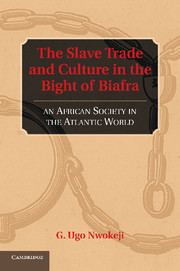Book contents
- Frontmatter
- Contents
- List of Tables and Figures
- Map of the Bight of Biafra and Its Hinterland
- Preface
- Foreword by Paul E. Lovejoy
- 1 Introduction
- 2 The Aro in the Atlantic Context: Expansion and Shifts, 1600s–1807
- 3 The Trade Diaspora in Regional Context: Aro Commercial Organization in the Era of Expansion, 1740–1850
- 4 Culture Formation in the Trading Frontier, c. 1740 to c. 1850
- 5 Household and Market Persons: Deportees and Society, c. 1740–c. 1850
- 6 The Slave Trade, Gender, and Culture
- 7 Cultural and Economic Aftershocks
- 8 Summary and Conclusions
- Notes on Sources
- Sources Cited
- Index
5 - Household and Market Persons: Deportees and Society, c. 1740–c. 1850
Published online by Cambridge University Press: 06 December 2010
- Frontmatter
- Contents
- List of Tables and Figures
- Map of the Bight of Biafra and Its Hinterland
- Preface
- Foreword by Paul E. Lovejoy
- 1 Introduction
- 2 The Aro in the Atlantic Context: Expansion and Shifts, 1600s–1807
- 3 The Trade Diaspora in Regional Context: Aro Commercial Organization in the Era of Expansion, 1740–1850
- 4 Culture Formation in the Trading Frontier, c. 1740 to c. 1850
- 5 Household and Market Persons: Deportees and Society, c. 1740–c. 1850
- 6 The Slave Trade, Gender, and Culture
- 7 Cultural and Economic Aftershocks
- 8 Summary and Conclusions
- Notes on Sources
- Sources Cited
- Index
Summary
The rise of the Atlantic slave trade increased not only the number of captives exported to the Americas but also the number who were retained in the region. The increasing importance of slave use in African political economies during the Atlantic slave trade era had implications for the trade in quite material terms: it implied a relationship between indigenous slavery and the Atlantic slave trade, which raises two inversely related central questions about Aro political economy. Why did the Aro retain people when the trade in people was the basis of their wealth and power? And why did the Aro and other slaveholders sell people when their social organization was based on group expansion?
In the Angolan case, Joseph Miller has asked and persuasively answered the second question. According to him, West-Central African entrepreneurs, who calculated their advantages based on the number of dependents that remained with them and the degree of their dependency, became slave traders reluctantly. They released “a portion of their hard-won dependents” to Euro-American slave traders as a last resort in order to acquire the imported goods that were necessary to attract dependents, even if the foreign slave traders came across as agents of a bad spirit and harbingers of death for those they took with them (Miller 1988:40, 105). Biafran entrepreneurs shared with their West-Central African counterparts a tendency to retain large numbers of dependents, especially from the mid-eighteenth century onward, but unlike the West-Central African entrepreneurs, they neither intended nor hoped to retain all the captives that came into their possession; instead, the Biafran entrepreneurs – particularly professional Aro and coastal traders – had by the mid-eighteenth century often come make a sharp distinction between captives they intended to keep and those they intended to sell.
- Type
- Chapter
- Information
- The Slave Trade and Culture in the Bight of BiafraAn African Society in the Atlantic World, pp. 117 - 143Publisher: Cambridge University PressPrint publication year: 2010



